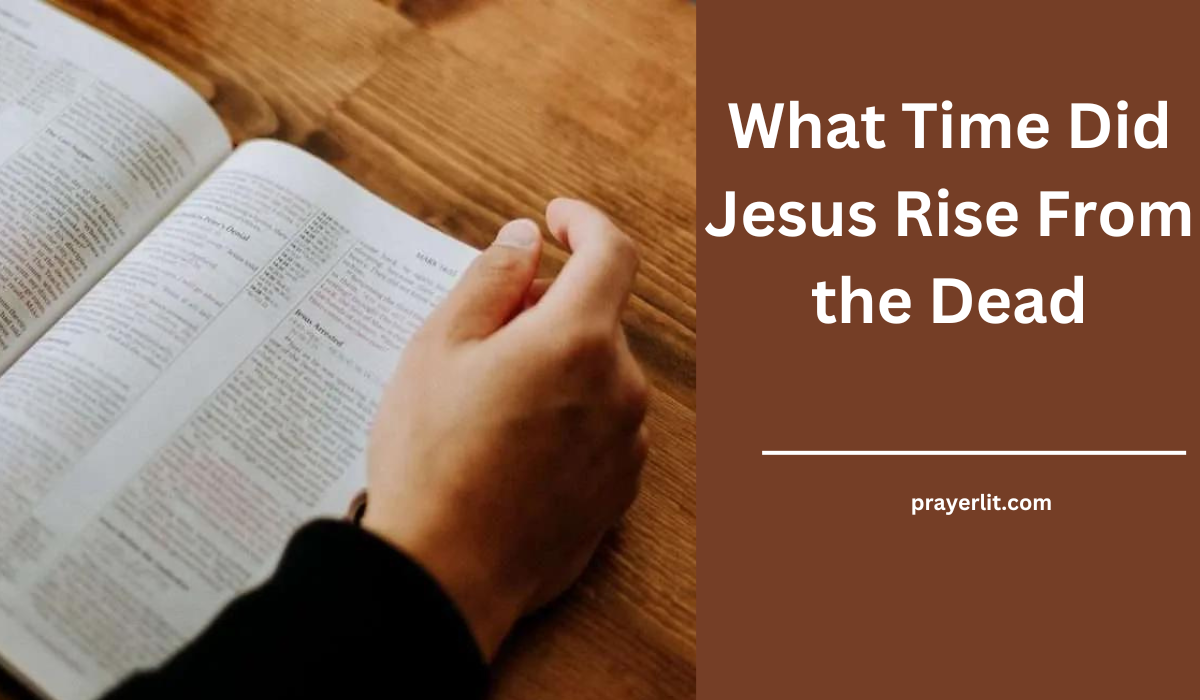The resurrection of Jesus Christ stands as the most pivotal event in Christian history. It not only affirms Jesus as the Son of God but also symbolizes the triumph of life over death, hope over despair. But among the many theological discussions surrounding the resurrection, one frequently asked question is: What time did Jesus rise from the dead?
This article explores the biblical evidence, cultural context, and spiritual significance of the time of Jesus’ resurrection, shedding light on one of Christianity’s most awe-inspiring mysteries.
Receive Daily Prayers in Your Mailbox
Need help with prayers? Subscribe to receive daily prayers and devotionals.

Why the Timing of the Resurrection Matters
Understanding the timing of Jesus’ resurrection isn’t just a matter of historical curiosity—it’s a doorway to deeper theological truths. The resurrection, foretold by Christ Himself, is a cornerstone of the Christian faith. It signifies:
Fulfillment of prophecy
Victory over sin and death
The dawn of a new spiritual era
For believers, knowing when Jesus rose helps tie together the symbolism of dawn, the third-day prophecy, and the transformation from darkness into light.
What Do the Gospels Say About the Resurrection Time?
Each of the four Gospels provides insight into the resurrection, and while none give an exact time, their descriptions allow us to narrow it down to a likely window—between midnight and sunrise on Sunday.
1. Matthew 28:1–6
“After the Sabbath, at dawn on the first day of the week, Mary Magdalene and the other Mary went to look at the tomb…”
This account states it was “at dawn,” and the tomb was already empty when the women arrived.
2. Mark 16:1–6
“Very early on the first day of the week, just after sunrise, they were on their way to the tomb…”
Again, it was early in the morning, and Jesus had already risen.
3. Luke 24:1–6
“On the first day of the week, very early in the morning, the women took the spices they had prepared and went to the tomb…”
Luke confirms an early arrival, with the tomb already open and empty.
4. John 20:1–8
“Early on the first day of the week, while it was still dark, Mary Magdalene went to the tomb…”
This is the earliest reference—while it was still dark. Even then, the stone had already been rolled away.
Summary:
All Gospels agree: by the time the women reached the tomb, Jesus had already risen. Therefore, His resurrection must have occurred sometime between late Saturday night (after sunset) and before sunrise Sunday morning.
Understanding Jewish and Roman Timekeeping
To make sense of the resurrection timeline, we must understand how time was tracked during Jesus’ era.
Jewish Timekeeping:
A day began at sunset (around 6 PM).
The Sabbath started Friday evening and ended Saturday at sunset.
Therefore, the “first day of the week” (Sunday) began Saturday evening by Jewish reckoning.
Roman Timekeeping:
A standard 24-hour day began at midnight.
Roman influence on timekeeping existed, especially among Gospel writers.
Given this, Jesus could have risen any time after sunset Saturday, though the tomb was discovered empty before or just after sunrise on Sunday.
Jesus’ Prophecy: Rising on the Third Day
Jesus repeatedly foretold that He would rise on the third day:
“The Son of Man must be delivered… and on the third day be raised again.” – Luke 9:22
“After three days He will rise.” – Mark 8:31
In Jewish culture, any part of a day counted as a whole day:
Day 1: Friday (crucifixion and burial before sundown)
Day 2: Saturday (Sabbath rest in the tomb)
Day 3: Sunday (resurrection at some point after sundown Saturday)
Thus, rising before dawn on Sunday perfectly fulfills the “third day” prophecy.
Spiritual Symbolism: From Darkness to Light
The timing of Jesus’ resurrection is deeply symbolic.
“While it was still dark…” – John 20:1
The darkness represents sin, death, despair.The discovery at dawn symbolizes hope, rebirth, and spiritual awakening.
Psalm 30:5 says, “Weeping may endure for a night, but joy comes in the morning.”
This prophetic verse encapsulates the essence of resurrection morning.
Why Sunday Morning Matters in Christian Tradition
Jesus rising on the first day of the week, Sunday, changed history forever:
Christians began worshipping on Sunday instead of the Jewish Sabbath.
It became known as the Lord’s Day (Revelation 1:10).
Easter Sunday and Sunrise Services commemorate the discovery of the empty tomb at dawn.
Sunday represents new beginnings, spiritual rebirth, and resurrection life.
Frequently Asked Questions
What time exactly did Jesus rise from the dead?
While Scripture does not specify the exact hour, all evidence suggests Jesus rose sometime between midnight and before sunrise on Sunday morning.
Was the resurrection on Sunday or Saturday night?
Technically, by Jewish timekeeping, Sunday begins at sunset on Saturday. Jesus could have risen any time after sunset, but the empty tomb was first discovered before or around dawn on Sunday.
Why does it matter what time He rose?
It emphasizes the symbolism of light overcoming darkness, validates Jesus’ own prophecies, and affirms the historical reality of the resurrection event.
How long was Jesus in the tomb?
He was buried late Friday, remained there throughout Saturday, and rose early Sunday—fulfilling the “three days” expression used in Jewish tradition.
Conclusion: He Rose Before the Dawn
Jesus rose from the dead sometime before dawn on the first day of the week. The Gospels unite on one powerful truth: the tomb was already empty when the women arrived early Sunday morning. Though the exact hour remains a divine mystery, the symbolism is clear:
From darkness came light.
From death came life.
From despair came eternal hope.
As you reflect on the resurrection, let it remind you that God does His greatest work in the darkest hours, often before we even realize it.
